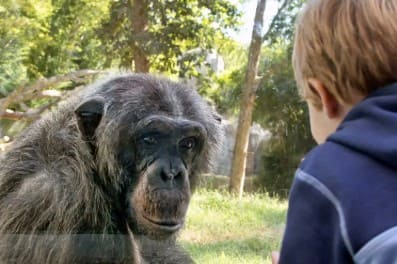Concern over eye health and stress prompts Shanghai Wildlife Park to draw the line
September 15, 2025 — Visitors to Shanghai Wildlife Park have been asked to stop showing videos on their phones to Ding Ding, a two-year-old chimpanzee who recently became a viral sensation for his fascination with watching content on visitors’ devices. The zoo says the rule is necessary to protect his eyesight and avoid mental distress.
Ding Ding: From Viral Darling to Protected Chimp
Ding Ding first captured public interest when video clips surfaced of him watching short videos held by visitors, reacting to sounds and visuals with animated curiosity. He also charmed many by sipping milk, sitting cross-legged, and tugging at lotus flowers. These behaviors helped him quickly become one of the most popular animals at the park.
Why the Ban Was Introduced
Zoo staff say that while Ding Ding seems entertained by phones, too much screen time could be harmful. Authorities worry that intense exposure to bright screens may damage his eyes. Unlike humans, the chimpanzee cannot wear corrective lenses. Officials also pointed out that if his vision deteriorates, he might become anxious or less able to interact, which could affect his overall health.
A sign was posted beside his enclosure, featuring an illustration of a chimp staring at a phone, with a big “NO” across the image. The notice, in both Mandarin and English, asks visitors not to play videos or hold screens up to the glass.
Reactions from the Public
The ban has drawn a mixed but largely supportive response. Many social media users praised the zoo for putting animal health first. Comments ranged from lighthearted jokes—some saying their children should take similar screen breaks—to more philosophical reflections on what amusement means when animals are involved.
Some visitors expressed amusement at how quickly this little chimpanzee became internet famous; others said it served as a reminder that animals have physical and mental limits, too.
What This Means for Animal Care & Visitor Behavior
This decision highlights evolving expectations in how zoos and wildlife parks manage popular animals. Viral moments can bring attention and affection—but they may also create pressure to cater to human entertainment, sometimes in ways that clash with animal welfare.
For Shanghai Wildlife Park, the move signals a shift toward more protective oversight. The zoo is balancing Ding Ding’s public appeal with responsibility for his wellbeing.
Published by HOLR Magazine


